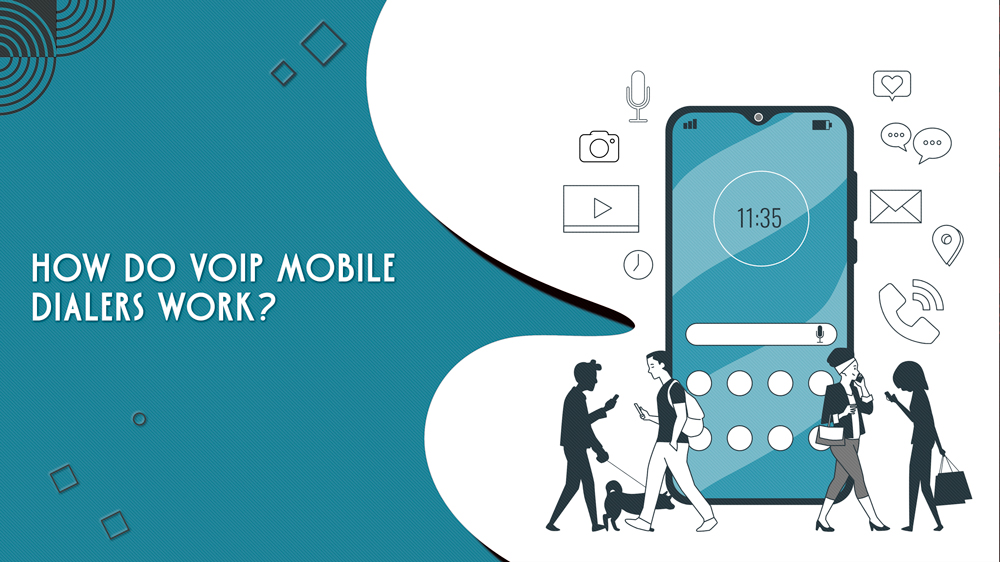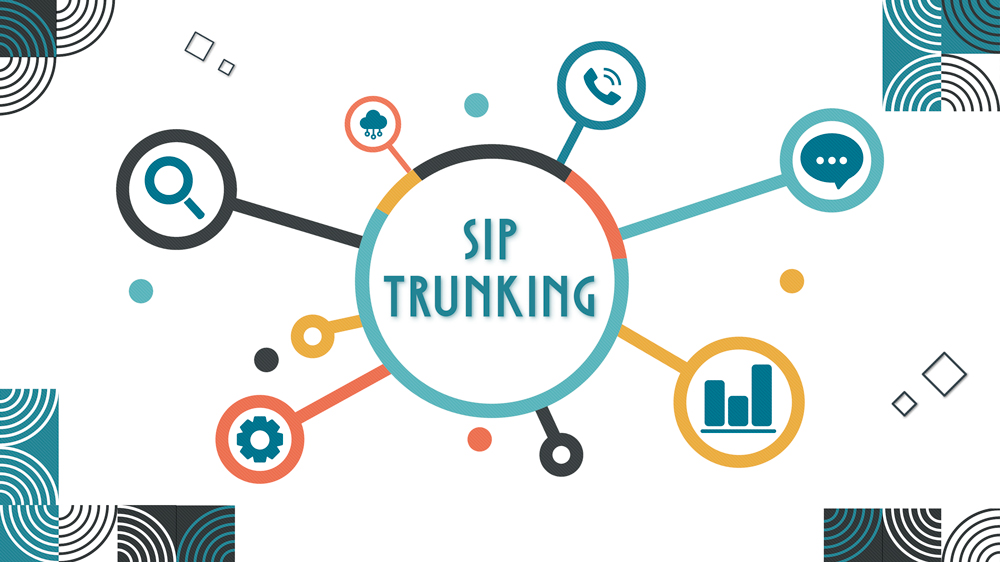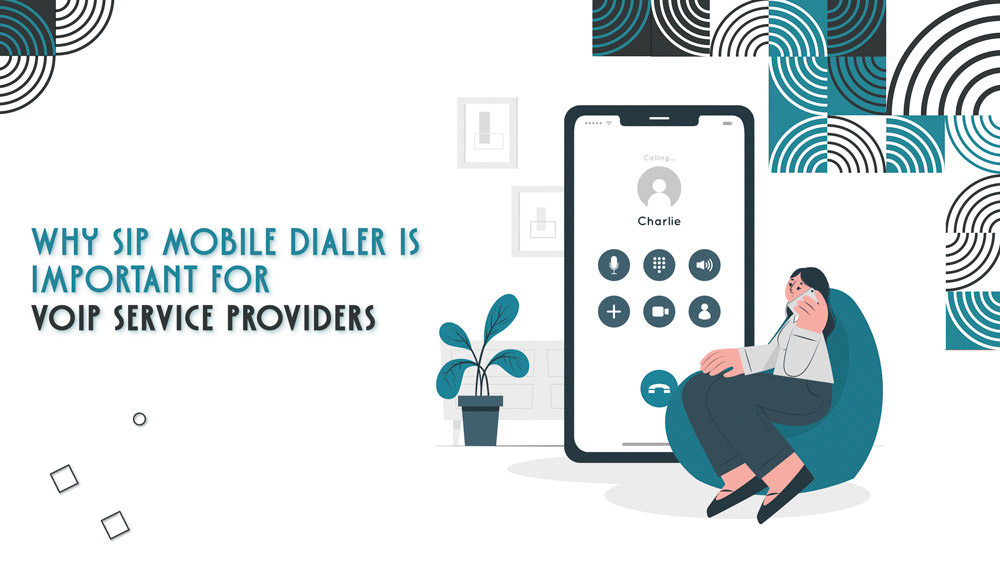What is a Mobile SIP Dialer?
A mobile SIP dialer, also known as a SIP` softphone or SIP client, is a software application that allows users to make voice calls over the internet using the SIP (Session Initiation Protocol) communication protocol. It enables users to use their mobile devices, such as smartphones or tablets, as IP phones to make calls over Wi-Fi or cellular data networks. Mobile dialers typically require an internet connection and a SIP-based VoIP (Voice over IP) service provider to establish and route calls. These dialers often offer additional features such as call recording, call transfer, and presence information. They provide a cost-effective alternative to traditional phone calls by leveraging the internet for voice communication.
Why Mobile VoIP Dialers are Important?
Mobile VoIP dialers are important for several reasons. Firstly, they allow users to make calls over the Internet, reducing the need for traditional phone lines and expensive long-distance charges. Because of this, they may be used by companies of different sizes, from little startups to huge corporations.
Secondly, mobile VoIP dialers offer greater flexibility and mobility. Users can make calls from anywhere as long as they have an internet connection, eliminating the need to be tied to a physical location. This is especially beneficial for remote workers, travelers, and those living in areas with limited phone network coverage.
Additionally, mobile VoIP dialers often come with advanced features like video calling, call forwarding, voicemail, and instant messaging. These features enhance communication experiences and allow users to stay connected in various ways.
Furthermore, mobile VoIP dialers integrate well with other communication platforms and software systems. They can be easily integrated with CRM (Customer Relationship Management) systems, allowing businesses to track and record customer interactions for better customer service and sales analysis.
Lastly, mobile VoIP dialers enable users to maintain a professional image. They often provide options for users to display their business phone number instead of their number when making calls. This not only helps to separate personal and professional calls but also creates a more professional impression on clients and customers.
In summary, mobile VoIP dialers are important because they provide cost-effective communication, flexibility, advanced features, integration capabilities, and the ability to maintain a professional image.
How Do VoIP Mobile Dialers Work?

VoIP (Voice over Internet Protocol) mobile dialers are applications that allow users to make phone calls using an internet connection rather than traditional phone lines. These dialers utilize the technology of SIP (Session Initiation Protocol) to establish and maintain phone calls. When a user wants to make a call using a VoIP mobile dialer, they open the application on their smartphone or mobile device. The dialer then connects to the VoIP service provider or SIP server through the internet. The user enters the desired phone number they wish to call, and the dialer sends this information to the service provider.
The service provider verifies the user’s account credentials, such as username and password, to ensure their identity and authorization to make the call. Once authenticated, the service provider initiates a connection with the recipient’s phone number or SIP address. The dialer and the VoIP service provider then establish a voice channel, encoding the user’s voice into data packets and transmitting them over the internet. These packets are sent in real-time and ensure that the recipient hears the caller’s voice with minimal delay.
During the call, the dialer constantly monitors the quality of the internet connection and adjusts the data transmission to maintain optimal call quality. This includes adjusting the bitrate and codec used for voice transmission, as well as handling any network issues that may arise. VoIP mobile dialers also offer features similar to traditional phone systems, such as call waiting, call forwarding, and conference calling. Some dialers also provide additional functionalities like call recording and integration with other apps or services.
Overall, VoIP mobile dialers work by utilizing the power of the internet and SIP technology to establish and maintain phone calls, providing a cost-effective and flexible alternative to traditional phone services.
VoIP Mobile Dialers Work for:
Voice & Video Calls
Call transfer
Contact book
Account balance
Call logs
Call hold & pick up
Secure Communication
Better Codec Support
Conference Calling
Supports any SIP Softswitch
Displays Call history
Integration with mobile phone book
User-Friendly Graphical Interface
Integration with Mobile Phone Book
Payment Gateway Integration
VoIP calls over 3G, 4G, and Wi-Fi networks
Multiple SIP Accounts Support
Call Timer
Accessible Call History
Call Statistics
Last Call Redial
Multimedia Sharing
Fast Call Connectivity
Secure Communication
Chat / Instant Messaging
Personal and Group Chat Options
Easy Integration with VoIP billing software
Advantages of a SIP Mobile Dialer
(A) Cost-effective: SIP (Session Initiation Protocol) mobile dialers use the internet to make calls instead of traditional telephony networks. This eliminates the need for expensive long-distance calling plans and international roaming charges, making it a more cost-effective option for businesses and individuals.
(B) Easy to use: These are typically user-friendly and easy to install on smartphones. Users can download the dialer app and start making calls over the internet without any required technical expertise.
(C) Enhanced flexibility: It allows users to make calls from anywhere with an internet connection, whether it’s a Wi-Fi network or mobile data. This offers greater flexibility and mobility, making it possible to stay connected even while traveling or in areas with poor cellular coverage.
(D) Better call quality: It provides better call quality compared to traditional phone calls. By utilizing advanced voice compression algorithms and prioritizing voice traffic over data, dialers can deliver clearer and more reliable calls.
(E) Integration with other communication tools: Mobile dialers can integrate with various communication tools and services, such as CRM systems, softphone applications, or call center solutions. This allows for unified communication and seamless integration of different communication channels.
(F) Scalability: Mobile dialer app development is highly scalable and can easily accommodate an increasing number of users.
(G) Advanced features: Dialers often come with a range of additional features, such as call recording, call transfer, voicemail, conferencing, and instant messaging. These features can enhance productivity and collaboration within a business environment.
(h) Compatibility with multiple devices: Mobile dialers are compatible with various devices, including smartphones, tablets, and desktops. This means that users can make calls from any device they prefer, using a single dialer application.
(i) Security: SIP dialers typically use encryption protocols to ensure the confidentiality and integrity of calls and data transmission. This provides an added layer of security and protects against eavesdropping or unauthorized access.
(j). Cost tracking and analytics: Mobile dialers often come with built-in reporting and analytics features, allowing businesses to track call durations, cost per call, and other metrics. This helps in analyzing call patterns and optimizing communication expenses.
Why should VoIP service providers offers Mobile SIP dialer development?

There are several reasons why VoIP service providers should offer SIP software development:
- Increased convenience: With a mobile dialer, users can make and receive VoIP calls directly from their mobile devices, providing them with greater convenience and flexibility.
- Expanded customer base: By offering a mobile dialer, VoIP service providers can attract more customers, especially those who rely heavily on mobile devices for making calls. This will help expand their customer base and lead to business growth.
- Competitive advantage: As the demand for mobile VoIP services continues to grow, offering a mobile dialer can give service providers a competitive advantage over their rivals who do not provide this feature.
- Improved user experience: Mobile dialers can offer advanced features such as call recording, call transfer, and instant messaging, which enhance the overall user experience and make the service more appealing to customers.
- Enhanced brand image: By providing mobile SIP dialer development, VoIP service providers demonstrate their commitment to innovation and meeting the evolving needs of their customers, which can enhance their brand image and reputation.
- Integration with other apps: With mobile dialers, service providers can integrate their VoIP services with other mobile applications, such as CRM systems or messaging platforms, creating a seamless user experience and increasing productivity.
Overall, offering mobile SIP dialer development can help VoIP service providers stay ahead in the market, attract more customers, and provide enhanced features and convenience to their existing users.
What are the features that we include in your App, for a simple mobile dialer?
For a simple mobile dialer app, there are several basic features that you can consider including:
Dial Pad: The app should have a numeric keypad where users can input phone numbers to make calls.
Call History: It should store a log of all incoming, outgoing, and missed calls, so users can easily check their call history.
Contacts Integration: Users should be able to access their phone contacts and dial numbers directly from their contact list.
Call Recording: Optional, but you can provide the functionality to record calls for future reference.
Call Blocking: Implement a feature to block specific numbers, preventing unwanted calls.
Speed Dial: Allow users to assign certain contacts to speed dial numbers for quick calling.
Voicemail: Provide a simple voicemail interface to listen to and manage voicemail messages.
Call Forwarding: The ability to set up call forwarding to redirect calls to an alternate number.
Bluetooth Support: Enable users to use the dialer app seamlessly with Bluetooth devices such as headsets or car kits.
International Calling: If your app supports international calling, include features like country codes and dialing rules.
In-App Purchases or Credits: If you plan to monetize your app, you can offer in-app purchases or credits for users to make calls to premium numbers or international destinations.
Remember, these are the basic features of a simple dialer app. You can always expand on them and add more features based on your requirements or user feedback.
How much does it cost to develop a basic mobile application dialer?
- Cost of hiring a development firm
- Project Complexity
- Prerequisites
- To-be-used platform
The cost of developing a basic mobile application dialer can vary depending on various factors such as the complexity of features, platform (iOS, Android, or both), region of development, and the development team’s hourly rates.
Typically, developing a basic dialer app can cost anywhere between $5,000 to $20,000. However, this is just a rough estimate, and the actual cost can be higher or lower depending on the specific requirements and complexities involved in the development process. It is advisable to consult with a professional app development agency or developer to get an accurate cost estimate for your specific project.
Conclusion
In conclusion, VoIP service providers must develop mobile SIP dialers due to the growing prevalence of mobile devices and the increasing demand for mobile connectivity. By offering a mobile dialer, these providers can cater to the needs of a broader customer base that relies on smartphones and tablets for communication.
This technology allows businesses and individuals to make and receive calls anytime and from anywhere, enabling them to stay connected and productive even when they are on the move. Moreover, mobile SIP dialers provide cost-effective solutions by utilizing internet connectivity, eliminating the need for traditional phone networks and lowering communication expenses. Overall, the development of mobile SIP dialers is crucial for VoIP service providers to remain competitive in the telecommunications industry and satisfy the evolving demands of their customers.



